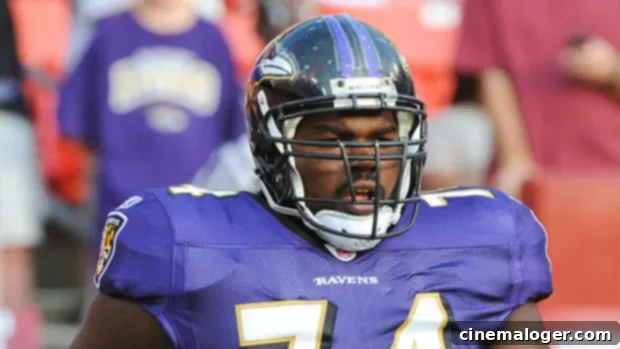Michael Oher Challenges “Blind Side” Narrative, Alleges Tuohy Family Never Legally Adopted Him
Former NFL player Michael Oher has ignited a significant legal and public debate, challenging the heartwarming narrative famously depicted in the book and Oscar-winning movie, The Blind Side. Oher recently filed a bombshell legal petition, asserting that Sean and Leigh Anne Tuohy, the family he believed had adopted him, never actually did so. Instead, he claims he was placed under a conservatorship, a legal arrangement he alleges was used to financially benefit the Tuohy family while he received no proceeds from the highly successful film. This revelation has sent shockwaves through Hollywood, the sports world, and among fans who were deeply moved by his inspirational story, prompting a reevaluation of a beloved tale.
On Monday, August 14, Michael Oher, now 37, released a statement to The New York Post, speaking publicly for the first time since the details of his legal filing emerged. The former professional football offensive lineman pleaded for privacy, describing the situation as “difficult” for him and his family. His statement underscored the deep personal impact of learning that his relationship with the Tuohys was legally structured as a conservatorship rather than the adoption he had always understood it to be. “I am disheartened by the revelation shared in the lawsuit today,” Oher expressed. “This is a difficult situation for my family and me. I want to ask everyone to please respect our privacy at this time. For now, I will let the lawsuit speak for itself and will offer no further comment.” This request for privacy highlights the profound emotional toll such a discovery can take, especially when a deeply personal story has become a widely consumed public narrative.
Unpacking the Legal Challenge: Conservatorship, Injunction, and Compensation
The core of Oher’s legal action centers on a petition to terminate the conservatorship that he claims was established in his name, not a legal adoption. Filed in a Tennessee probate court, the lawsuit seeks to dismantle the legal arrangement that Oher alleges has bound him to the Tuohys since 2004. Beyond terminating the conservatorship, Oher is also seeking an injunction that would prevent the Tuohy family from continuing to use his name, image, and likeness for their financial benefit. Furthermore, he is demanding compensation for what he claims are profits derived from The Blind Side that he never received. The lawsuit details that Oher explicitly requested the conservatorship be dissolved, arguing that there is no legal basis for it to continue, especially given that he is an adult fully capable of managing his own affairs. The petition states, “All monies made in said manner should in all conscience and equity be disgorged and paid over to the said ward, Michael Oher.”
According to the legal filing, the gravity of the situation was unknown to Oher until recently. He claims he did not learn that he was under a conservatorship, rather than having been legally adopted, until February 2023. This alleged belated discovery forms a crucial part of his argument, suggesting he was unaware of the true nature of his legal ties to the Tuohy family for nearly two decades. The lawsuit also claims that Oher received no financial compensation whatsoever from The Blind Side, the incredibly successful film adaptation of Michael Lewis’s book. The movie, which grossed over $300 million worldwide and earned Sandra Bullock an Academy Award for her portrayal of Leigh Anne Tuohy, depicted a story of a struggling Oher being taken in by the wealthy Tuohy family and ultimately finding success in football. Oher’s petition specifically alleges that the conservators “have allowed Michael, specifically, and the public, generally, to believe that Conservators adopted Michael and have used that untruth to gain financial advantages for themselves and the foundations which they own or which they exercise control.”

The Tuohy Family’s Responds to the Allegations
In the wake of Oher’s shocking claims, the Tuohy family has swiftly responded, offering a different perspective on the allegations. Sean Tuohy, upon learning of the petition, spoke out in a statement to The Daily Memphian, expressing his deep distress over the accusations. He vehemently denied profiting off Oher, emphasizing the family’s affection for him. “It’s upsetting to think we would make money off any of our children. But we’re going to love Michael at 37 just like we loved him at 16,” Sean Tuohy stated, aiming to reaffirm their long-standing bond. He further clarified the financial aspect, asserting that all members of the family, including Michael, received an equal share of money from the movie, which he claimed amounted to approximately $14,000 each. “Everybody in the family got an equal share [of money from the movie], including Michael. It was about $14,000, each,” he explained. Sean Tuohy also stressed that they “were never offered money; we never asked for money,” and highlighted that his personal wealth is “well-documented,” inviting scrutiny into his financial background. His response paints a picture of a family genuinely trying to help a young man in need, refuting any claims of exploitation.
Adding to the family’s defense, Sean “SJ” Tuohy Jr., the youngest child of Leigh Anne and Sean Tuohy, also addressed the filing in an interview with Barstool Sports. SJ expressed his love for Michael Oher, reiterating the strong bond they shared, while also admitting that some of the claims made in the lawsuit were “hard to believe.” “I’m going to preface this by saying I loved Mike at 16… I love Mike now at 37 and I love him at 67,” SJ began, underscoring the duration and depth of his affection for Oher. His comments reflected a sense of confusion and sadness regarding the legal battle, indicating that from his perspective, the family dynamic was one of genuine care and support. The Tuohys’ responses collectively present a narrative of a family caught off guard by these allegations, steadfast in their claim that their intentions were always pure and their actions guided by love for Oher, portraying the financial arrangements as transparent and minimal rather than exploitative.
Distinguishing Conservatorship from Adoption: A Critical Legal Clarification
Central to this unfolding drama is the fundamental legal distinction between a conservatorship and an adoption, a difference that forms the crux of Michael Oher’s petition. A conservatorship, as alleged in Oher’s case, is a legal arrangement where a court appoints an individual or organization (the conservator) to manage the financial affairs, daily life, or both, of another person (the conservatee) who is deemed unable to do so themselves. Historically, these are often established for minors or adults with severe mental or physical incapacities. While it grants significant control to the conservator, it does not establish a familial relationship; it is strictly a legal guardianship over an individual’s estate or person. It allows the conservator to make decisions on behalf of the conservatee, including financial transactions, medical decisions, and other personal matters, but it does not confer parental rights or responsibilities in the way adoption does.
In stark contrast, legal adoption creates a permanent, legally recognized parent-child relationship. Once an adoption is finalized, the adoptive parents assume all the legal rights and responsibilities of biological parents, and the adopted child becomes a full legal heir and member of the family, typically losing legal ties to their biological parents. This includes rights to inheritance, family name changes, and the establishment of a formal, familial bond recognized by law. The implications of this distinction are profound for Michael Oher. If, as he alleges, he was under a conservatorship rather than being adopted, it means he never formally became a legal member of the Tuohy family. He would not have had the same rights to inheritance, nor would the Tuohys have had the same parental responsibilities as adoptive parents. For Oher, this difference transforms a story of family and unconditional love into one of legal and financial control, radically altering the perceived nature of his relationship with the Tuohys and the foundation of his inspiring journey as told in The Blind Side.
Broader Implications and Public Scrutiny: Revisiting a Beloved Narrative
The allegations brought forth by Michael Oher have sent ripples far beyond the immediate parties involved, sparking widespread public scrutiny and forcing a reevaluation of a beloved American story. The Blind Side, both the book and the movie, has for years been celebrated as a testament to compassion, resilience, and the power of family, shaping public perception of Oher’s early life and the Tuohys’ benevolence. The film’s success cemented this narrative in popular culture, leading to millions worldwide seeing the Tuohys as heroes who selflessly opened their home and hearts. Oher’s lawsuit challenges this deeply ingrained image, casting a shadow of doubt over the motivations and actions portrayed. It forces audiences and media alike to revisit the narrative with a critical eye, questioning whether the inspirational story was, in part, built on a foundation of misrepresentation or misunderstanding.
This case also resonates within a broader societal conversation about conservatorships and the potential for abuse within such legal arrangements. In recent years, high-profile cases, such as that of Britney Spears, have brought increased public awareness and skepticism regarding conservatorships, particularly when they involve individuals capable of making their own decisions. Oher’s situation adds another significant voice to this discussion, highlighting how legal structures intended to protect vulnerable individuals can be perceived as exploitative. The public’s reaction has been divided, with many expressing shock and sympathy for Oher, while others defend the Tuohy family, recalling their public support for him. The media’s role in dissecting this story is crucial, as they navigate the complexities of personal narrative versus legal fact, challenging readers to consider multiple perspectives on a story they thought they knew. This ongoing legal and public battle promises to reshape the legacy of The Blind Side and profoundly impact the lives of all involved.
What Lies Ahead: The Future of the Legal Battle
The legal road ahead for Michael Oher and the Tuohy family is undoubtedly complex and could be protracted. Oher’s petition to terminate the conservatorship will initiate a formal legal process requiring judicial review. The court will need to assess the validity of the original conservatorship, the circumstances under which it was established, and whether its continuation is legally justifiable, especially given Oher’s status as a competent adult. This will likely involve examining historical documents, witness testimonies, and legal arguments from both sides. Should the court agree to terminate the conservatorship, it would be a significant victory for Oher, affirming his legal autonomy and potentially setting the stage for further legal action regarding financial compensation.
The requests for an injunction against the Tuohys using Oher’s name and likeness, as well as demands for compensation for alleged movie proceeds, present another layer of legal challenge. These claims will require detailed financial disclosures and potentially a deep dive into the contracts and earnings associated with The Blind Side. The Tuohys’ assertion that all family members, including Oher, received an equal and relatively modest sum from the movie will be directly scrutinized against Oher’s claims of receiving nothing. The outcome of these financial disputes could significantly impact the Tuohy family’s public image and financial standing. Regardless of the specific legal verdicts, this battle will undoubtedly leave an indelible mark on all parties involved, compelling a re-examination of the true narrative behind The Blind Side and reminding everyone that behind every public story are complex, deeply personal realities.
